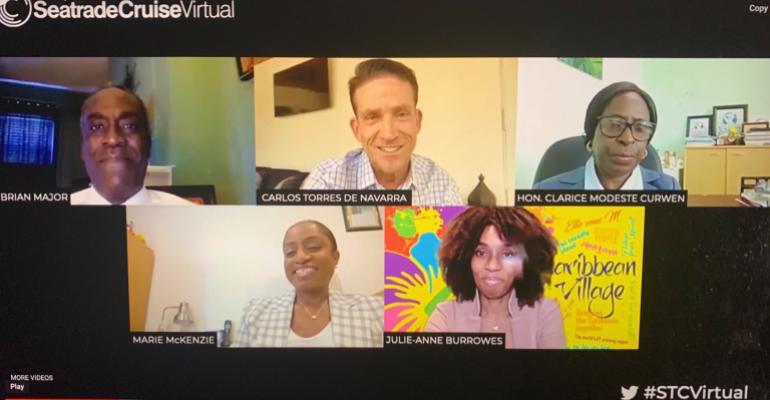So said the Caribbean update session speakers at Seatrade Cruise Virtual.
'We need our partner destinations. We can't do it without them,' according to Marie McKenzie, VP global ports & Caribbean government relations, Carnival Corp & plc.
'We need to get this right'
'We need to get this right,' she said. '... Governments do have legitimate concerns about how we are going to be screening and managing if someone gets sick. They want very clear guidelines how this will work. We're also looking for clarity from the destinations.' Each destination, McKenzie added, may have specific requirements.
Early in the COVID-19 crisis, communication was lacking, said Clarice Modeste-Curwen, minister for tourism and civil aviation, Grenada. But the cruise lines' ability to safely repatriate crew without bringing the virus into Grenada generated trust.
'They delivered what they agreed to deliver,' she said.
Caribbean in a 'high-demand situation'
Since Grenada and the Caribbean have done a 'wonderful job of containing the virus,' with low transmission and mortality rates, that puts them in a 'very strategic, high-demand situation' for the resumption of travel, according to the minister.
But not every place will see ships initially.
The gradual resumption of cruising, starting with short itineraries, will help gain trust, said Miami-based industry consultant Carlos Torres de Navarra. Once the confidence level is there, lines will start elongating the cruises and going to more destinations.
Meanwhile, Grenada is preparing with training and dry runs, while also educating its people to know what to expect.
'The people in our communities must feel safe that they can welcome visitors to our shores,' Modeste-Curwen said. 'When the time comes, we are going to be ready.'
Added allure of beaches plus community/ecotourism
The pause has given a chance to look at the tourism product from a different perspective, Torres de Navarra said. He enthusiastically endorsed the minister's observation that just being able to go and relax on a beach will be very enticing to people who've been cooped up for months — some in places where beaches were closed.
When people do start traveling, Torres de Navarra said, the value of cruising will be there.
For Grenada, this is also an opportunity to highlight community tourism and ecotourism. 'We have so much — our mountains, our trails,' Modeste-Curwen noted. 'There are a number of things we can do in small groups. Grenada has a wealth of it, other islands, too.'
Giving visitors 'the time of their lives'
To draw visitors back, 'We're working energetically to generate their trust and confidence, and to give them the time of their lives.'
'People want to cruise,' Carnival Corp.'s McKenzie confirmed 'They want to come back to the destinations.'
And the destinations need the economic impact from cruising, according to Julie-Anne Burrowes, cruise advisor, Caribbean Village, a regional destination marketing group. Not just at the top, but all along the stakeholder chain, including the frontline workers and small businesses that depend on cruise ship visitors.
Equitable partnership
Burrowes added that sustainability in all aspects — social, environmental and economic — must be 'central to anything we do going forward.'
Transparency and trust between the stakeholders, with an equitable partnership that includes local communities, will be key, she said.
Burrowes cited the adage: 'If you want to go fast, go alone. If you want to go far, go together.'
Copyright © 2024. All rights reserved. Seatrade, a trading name of Informa Markets (UK) Limited.
Add Seatrade Cruise News to your Google News feed.  |

